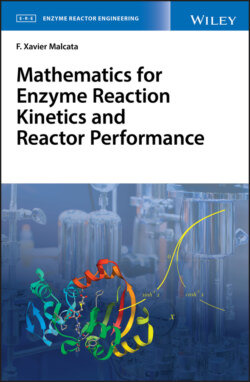Читать книгу Mathematics for Enzyme Reaction Kinetics and Reactor Performance - F. Xavier Malcata - Страница 19
2.1.1 Arithmetic Series
ОглавлениеConsider a series with n terms, where each term, ui, equals the previous one, ui–1, added to a constant value, k – according to
(2.75)
or, equivalently,
(2.76)
is termed a (finite) arithmetic progression, or arithmetic series, of increment k and first term u0. Equation (2.76) may obviously be reformulated to
(2.77)
using the last term,
(2.78)
instead of the first one, u0, as reference; upon ordered addition of Eqs. (2.75) and (2.77), one obtains
(2.79)
– where cancelation of symmetrical terms reduces Eq. (2.79) to
(2.80)
Upon factoring n + 1 out in the right‐hand side, followed by division of both sides by 2, Eq. (2.80) becomes
(2.81)
– i.e. it looks as n + 1 times the arithmetic average of the first and last terms of the series; insertion of Eq. (2.78) permits transformation to
(2.82)
that breaks down to
(2.83)
– valid irrespective of the actual values of u0, k or n.
Note that an arithmetic series is never convergent in the sense put forward by Eqs. (2.72) and (2.73), because the magnitude of each individual term keeps increasing without bound as n → ∞; this becomes apparent after dividing both sides of Eq. (2.83) by u0 and retrieving Eq. (2.72), i.e.
(2.84)
which translates to Fig. 2.4. In the particular case of k = 0, Eq. (2.83) simplifies to
(2.85)
consistent with the definition of multiplication – which describes the lowest curve in Fig. 2.4, essentially materialized by a straight line with unit slope for relatively large n; as expected, a large k eventually produces a quadratic growth of Sn with n, in agreement with Eq. (2.84).
Figure 2.4 Variation of value of n‐term arithmetic series, Sn, normalized by first term, u0, as a function of n – for selected values of increment, k, normalized also by u0.
